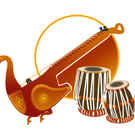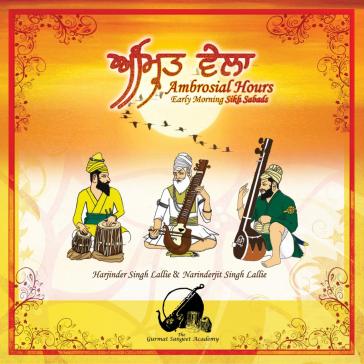Search the Community
Showing results for tags 'gurmat sangeet'.
-
New preservation project needing our love and attention , SInghs hope to preserve kirtan parampara by recording and annotating purataan reets gurmat sangeet from older raagi parivaars and masters in India and Rababis in Pakistan . Initial target is for 20,000 GBP https://www.crowdfunder.co.uk/sikh-music Overview As time passes, oral histories and memories of a rich Sikh musical history die with the elders. Building on current research, we want to capture the knowledge and memories of the elder generation. Together we can collect and immortalise one of the most vibrant and rich musical histories of South Asia. We are fundraising for a unique and unprecedented project involving: Two fieldwork trips, to India and Pakistan respectively, in order to conduct the necessary archival and interview work for our PhD research project on gurbani kirtan, the sacred music of the Sikhs. The production of a documentary on gurbani kirtan, based on this research work. Background Sikhism is unique among the world’s major religion for at its heart lies music. The sacred scriptures of the Sikhs contains devotional songs, or shabads, of the gurus, their poets and musicians, and some of the most influential Sufi and Hindu saints of medieval India. Representing the living source of guidance, or guru, for the Sikhs, the scriptures transcend religious boundaries and operate through the powerful medium of music. Each shabad is a sonic entity which encapsulates a divine message inspiring the qualities of devotion, consciousness, remembrance, and love for humanity. The onslaught of the forces of colonialism, modernisation, commercialisation, westernisation and popularisation over the last century and a half, has led to the decline of a once thriving oral tradition. It has resulted in the loss of priceless intangible heritage, in the form of music, that was once as important as the written word. The sacred music tradition of the Sikhs has been transformed such that it bears almost no resemblance to the past still remembered by some of the elders. Want to learn more and help raise awareness of this fascinating musical tradition? Please support our work! The Research Project Kirit Singh is currently undertaking his PhD, titled ‘Kīrtan and Kalā: Patrons and Musicians of Gurbāṇī Kīrtan and Hindustani Music in Punjab, 1801 to 1947’, at SOAS University, London, under the supervision of Prof. Richard Widdess. This study is the first of its kind to explore in detail the tradition of gurbani kirtan in relation to Hindustani music in the Punjab region, during the unique period in which both traditions came to enjoy significant patronage from the Sikh princes and aristocracy. The study aims to document the outcome of the interactions and exchanges in such environments by drawing on written sources and oral histories. It will also focus on the major religious centres, such as Amritsar, which fostered a flourishing musical environment. The university fees for this PhD are generously being supported by the Yogi Tea Foundation. With your support we will be able to carry out the necessary archival and interview-based fieldwork in the Punjab region that will underpin the findings of this unique and unprecedented PhD study. The fieldwork will involve six months spent in India and three months in Pakistan. The Documentary With your support we will be able to share the fascinating story of the gurbani kirtan tradition through the accessible medium of film. This documentary will be unprecedented. Not only will it be founded on the highest level of PhD research and academic integrity, but it will be produced by two passionate researchers, who are themselves musicians and have an intrinsic understanding of the musical tradition which they are studying. It will shed a new perspective on the kirtan tradition by featuring input from some of the most influential names of Hindustani music today. "We hope to portray the richness of the Sikh musical tradition in its former glory, prior to the influence of colonialism, the rise of Bollywood music, and the catastrophe of Partition. Our aim is to raise awareness and inspire a change in attitudes towards one of South Asia’s richest musical traditions." Here is an example of the musical legacy from a bygone era of Sikh musical excellence: About us With an MEng in Computing from Imperial College London, Kirit Singh left his promising career as a programmer, early on, to follow his passion for Hindustani music and gurbani kirtan. He has studied gurbani kirtan from senior musicians of the Namdhari community, who are primary custodians of the rababi tradition in the 21st century. He is a disciple of one of the leading torchbearers of dhrupad vocal music internationally, Pt. Uday Bhawalkar. Cultivating his research interests in the field of gurbani kirtan, he went on to complete his MMus in Ethnomusicology at SOAS in 2016, and is now undertaking a PhD on the subject. Jasdeep Singh was initiated into the Tabla and Jori by a leading maestro of the Benares and Punjab traditions, Ustad Sukhvinder Singh ‘Pinky’. He has gone on to widen his understanding of the instruments by studying under some of the other leading percussionists of our times including, Pt. Ravi Shankar Upadhyay, Pt. Sanju Sahai, and Pt. Yogesh Samsi. He is one of the few musicians of his generation carrying forward the unique but dying art of the Jori of Punjab. His research interests lie in the gurbani kirtan tradition and, especially, the percussive aspects of the Jori, Pakhawaj and Tabla. Together, Kirit Singh and Jasdeep Singh, with their shared passion and musical bond, have collaborated successfully on several musical projects. As performing artists, they are dhrupadhamar, one of the few representatives of the dhrupad style within gurbani kirtan internationally. They have also been instrumental in setting up the London based South Asian Music Forum, targeted towards cultivating a community for South Asian music in the UK, that not only supports young artists, but encourages a more authentic and intimate mode of music consumption. Last, but not least, their common research interests have brought them together in their academic work on the gurbani kirtan tradition in which they are collaborating on a significant PhD project and the production of a documentary. Funding Breakdown All figures are estimated based on average prices and current exchange rates. International Travel (return flights & visas for 3 people to India & Pakistan) - £2,400 Maintenance Costs for interview & documentary filming (accommodation, food and local travel for 3 people) - £4,200 for extended archival research (accommodation, food and local travel for Kirit Singh only) - £6,300 Audio-visual costs (videographer & equipment) - £5,000 Echange rate margin (5%) - £895 Crowdfunder fees (8%) - £1,505 TOTAL £20,300
- 3 replies
-
2
-
- sikh heritage
- gurmat sangeet
-
(and 3 more)
Tagged with:
-
Vaheguru Ji Ka Khalsa! Vaheguru Ji Ki Fateh! Does anybody know where I can find the first part to this book? Either free or for purchase; digital, paperback, or hardcover--anything will work! I know the second part is available from JSKS, but the first part has been out of publication for quite some time. I've been desperately seeking out this book for years now with no luck, including in shops in India :-/ Much thanks if you do find a copy!
-
waheguru ji ka khalsa waheguru ji ki fateh Question for the Raagi Gyanis and Ustaads: I am trying to differentiate between the main raag keertan styles. In the big Gurdwaras, the tanti saaj Raagis sing in a sing-a-long fashion (repeating melody, rapid progress through the shabad). However there is another rarely heard style where the singing is very different: substantive vibrato/voice echo, slow progress- once verse may be chewed upon for a very long time with great emotion and improvisation. Listen to the following two clips which demonstrate this (Man Japoh Ram Gopal - 1 in 'sing-a-long' style and 2 in the 'slow tempo' style). -Are there any names to describe these two types of vocalisation? Is it correct to say that the vocalisation of the latter is a genre such as Dhrupad? -In simple terms what is the difference between the two? Do they have the same core basis? -Can all ustaads teach the second type? Sample 1-Raag Kanra- Man Japo Ram Gopal-Prof Surinder Singh.mp3 Sample 2-Raag Kanra- Man Japo Ram Gopal-Ustad Harbhajan Singh, Balwant Singh Namdhari..mp3
- 1 reply
-
- gurmat sangeet
- keertan
-
(and 1 more)
Tagged with:
-
Can someone list a kirtani(s) who do kirtan in raag. I know the famous ones like bhai balbir singh ji and bhai avtar singh ji. Actually I need something that I can practice my tabla to ( so someone who doesnt speed their rhythm in their kirtan).
- 13 replies
-
- raag
- gurmat sangeet
-
(and 1 more)
Tagged with:
-
Vaheguru Ji Ka Khalsa Vaheguru Ji Ki Fateh This is for aspiring students or collectors. https://www.gumtree.com/p/other-string-instruments/rare-beautiful-hand-crafted-dhrupad-sursringar-indian-classical-instrument-manoj-kumar-sardar/1121470223 - Sursringar https://www.gumtree.com/p/other-instruments/rare-beautifully-hand-crafted-saranda-indian-classical-instrument/1135058419 - Saranda For more info, please message me. Kind Regards, Manpaal Singh
- 3 replies
-
1
-
- kirtan
- gurmat sangeet
-
(and 2 more)
Tagged with:
-
‘Amrit Vela’ is the first official music release by The Gurmat Sangeet Academy (GSA) - a ‘not-for-profit’ Sikh Music school. The primary artists Bhai Harjinder Singh Lallie and Bhai Narinderjit Singh Lallie are very well known in the UK and abroad for their very traditional and orthodox kirtan which is performed using authentic stringed and percussion instruments such as the taoos and the Jori. During the twentieth century, kirtan became increasingly influenced by both internal and external pressures such as the growing popularity of popular music (film, bhangra etc). Sikh ragis were directly influenced by this and this led to a deterioration in upholding our musical traditions leading to a near extinction of particular Sikh instruments, reets (musical renditions and tunes) and even the rendition of some of our ragas. The GSA set out to reinvigorate these styles and in particular to raise awareness of the traditional style of kirtan. The release of 'Amrit Vela’ comes amidst a revival of traditional Sikh musical instruments and an avid interest in Sikh musicology around the UK and the rest of the world. The album features a number of traditional compositions performed with a number of Sikh instruments including the Sarangi, Taoos, Dilraba, Tarsehnai and the Rabab. All the recordings are accompanied by the Jori (Sikh percussion) and a tabla. This album contains sabads that are in Ragas generally recited in the early hours of the morning during sunrise. During these hours one has the opportunity for deep contemplation and self-reflection, it is an opportune time for spiritual practice and growth. The Sikh scriptures give Gurbani Kirtan the highest status with regards to spiritual practice and we hope the listener can appreciate the subtleness, penetrating and empowering sequencing of notes within the Ragas and sabads chosen for this album. Amrit Vela can be purchased directly from the Gurmat Sangeet Academy from here: http://www.gurmatsangeet.org/purchaseamritvela/. Alternatively, you can purchase from iTunes/Amazon by clicking here: http://www.gurmatsangeet.org/purchase-ambrosial-hours/. In addition, the album is also available from DTF stores (Birmingham UK). The Gurmat Sangeet Academy provides professional and high class Indian music tuition open to all regardless of background, colour, race, religion and perhaps most importantly musical ability! Their aim is to promote kirtan (Sikh music), especially Tanti Saaj (stringed instruments) based kirtan which is done in accordance with Gurmat (the way of the Guru) Contributions made by the musicians on the album are done solely on a Seva (selfless service) basis and all proceeds are going back into Gurmat Sangeet Academy projects. These projects are purely non-profit in which no money is made by any of the project contributors. All proceeds go back into Seva and to maintain the future longevity of the series. We urge you to offer your support by purchasing only legitimate and legal copies of the album. Press and media can claim a free copy of “Amrit Vela” from the Gurmat Sangeet Academy team by emailing harj@lallie.co.uk citing 'general enquiries' in the subject header.
-
- kirtan
- gurmat sangeet
-
(and 4 more)
Tagged with:
-
Guru Fateh all, Does anyone know where I can learn gurmat sangeet with tanti saaj in or around southall/slough areas? Regards




